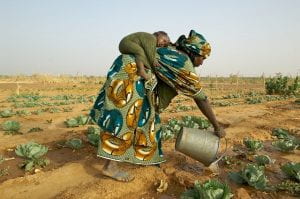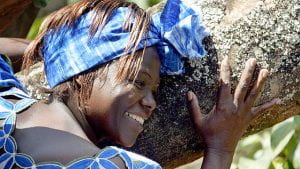“Environmental protection is not just about talking. It is also about taking action.” – Wangari Maathai

Women have always been seen as the caretakers and nurturers. That is our responsibility. In Africa, women are in charge of tilling, plants, nurturing, and harvesting the food. “They are the first to become aware of environmental damage that harms agricultural production” as they can see it in the faces of their spouses, friends, and children (Maathai). These women depend on their land. The richness of soil, the abundance of rain, the shade provided by trees; all depend on a woman to tend to their needs so their families and communities can survive.
The Green Belt Movement helps with this survival. Founded by Wangari Maathai, “encourag[es] the farmers (70 percent of whom are women) to plant ‘Green Belts’ to stop soil erosion, provide shade, and create a source of lumber and firewood” (Maathai). She is an advocate for the environment, hoping to teach countries all over the world of the importance of our environment. If we take care of the land then the land will take care of us in return. She is also an advocate for women’s rights. Since the Green Belt movement began in 1977, over 15 million trees have been planted.
Maathai, “encourag[es] the farmers (70 percent of whom are women) to plant ‘Green Belts’ to stop soil erosion, provide shade, and create a source of lumber and firewood” (Maathai). She is an advocate for the environment, hoping to teach countries all over the world of the importance of our environment. If we take care of the land then the land will take care of us in return. She is also an advocate for women’s rights. Since the Green Belt movement began in 1977, over 15 million trees have been planted.
These environmental wins have also come with many hardships. While speaking up for their needs, women in Africa have been severely abused, violated, and thrown in jail. While raising concern for the environment, these women are also speaking for themselves and their personal rights. Violence is what they get in return. That has not stopped Maathai, as she has accomplished many great things in her life and has never let anything stop her from achieving her goals.
 Latin America faces similar environmental issues, as there is an overabundance of pollution. These communities rely on the rivers as a clean source of water, but they have only met devastation. They are unable to grow food, use the water, and children are getting sick. The lack of care for this environment confirms how the women are treated in these communities.
Latin America faces similar environmental issues, as there is an overabundance of pollution. These communities rely on the rivers as a clean source of water, but they have only met devastation. They are unable to grow food, use the water, and children are getting sick. The lack of care for this environment confirms how the women are treated in these communities.
“Daily life for poor women is like a jail, as I said before. A new morning comes. We send children to school…We have nothing to cook…They hope the children have already eaten, but they have not. Night arrives and brings back the men… Often the men eat before returning home or only drink alcohol. The cycle of domestic jail finished today and now women wait to begin again tomorrow, probably with the bad news of a new pregnancy” (Gebara).
The places that have a small amount of care for their environment, the more likely women are going to suffer. When speaking up for their environmental rights in Africa, Maathai was mutilated. In Latin America where women cannot afford food or have access to clean water, they are abused and starve with their children.
Indigenous nations have been persecuted, oppressed, and taken advantage of for too long. Their land has been taken, they have been forced to relocate, and in some instances they have lost their connection to their lands. These “environmental projects” for oils, mines, etc. have pushed the boundaries and have caused generations of harm and violence.

Lizzy – great work! I especially like how you weave together the struggles of women in both Africa and Latin America. As we have learned, the daily struggles of women in the global South are vastly different from the those in the global North. While the struggles mentioned are similar, the root cause is due to the oppression of women and nature, largely based on the lack of respect and value illustrated by the patriarchal agenda. We see countless examples of the oppression of both women and nature, and yet, it is women who are activists for saving their own communities and nearby natural resources. Ivone Gebara offers “We need to act for a better world in its local, national, and international structures. This is the consequence of a new believing in connectedness as a political issue” (Gabara, 98). With this, she stresses the importance of local changes requiring thoughtful and strategic execution. While I’m not sure this is always the case, I find it impressive when a local movement reaches so wide that it creates change – a ripple effect – in lands across the globe. We see how Maathai did this, in starting her Green Belt Movement in Kenya, she focused on a local issue. In empowering women to plant trees (which helped slow soil erosion, created shade, and produced necessary lumber), they also created a collective community that learned about forestry management (Cstraight Media – http://www.cstraight.com). Through the success of this movement in Kenya and Africa, it now is practiced in over thirty countries throughout the world. These women are leading by example in combating issues of disempowerment and environmental degradation. It is their courage, activism, and passion that continue to propel issues of women’s equality issues and the environmental forward, in hopes of creating lasting change for generations to come.
Cstraight Media – http://www.cstraight.com. Speak Truth to Power | the Green Belt Movement. http://www.greenbeltmovement.org/wangari-maathai/key-speeches-and-articles/speak-truth-to-power.
Gebara, Ivone. “Ecofeminism: A Latin America Perspective.” Cross Currents, no. Spring 2003, 2003.
Hi Lizzy!
Great post! You give a really great synopsis of a lot of issues across the world and you deliver the information in an interesting and palatable way. I love the photos that you chose to add. They help to add depth to your work and it was so much easier to connect and understand the subjects at hand with the visual aids. You really hit the issues and how they pertain to women in particular, I really appreciated your sections from Wangari Maathai. Not only do you capitalize on the Green Belt Movement and the function that it serves but on Maathai herself, the work she has done, and the impact she has had on her culture and community. You also speak on the correlation between women protecting their environment and the violence they face as a result, but in a way that evokes strength and reverence for the women who speak up.
Elizabethe Schlumbohm
root-apk — это отличный способ изменить игровой опыт.
Особенно если вы играете на Android, модификации открывают перед вами широкие горизонты.
Я часто использую игры с обходом системы защиты, чтобы наслаждаться бесконечными возможностями.
Модификации игр дают невероятную свободу в
игре, что взаимодействие с игрой гораздо красочнее.
Играя с модификациями, я могу добавить дополнительные функции, что добавляет приключенческий процесс и делает игру более достойной внимания.
Это действительно захватывающе,
как такие моды могут улучшить переживания
от игры, а при этом с максимальной безопасностью использовать такие игры с изменениями можно без особых неприятных последствий, если быть внимательным и следить за
обновлениями. Это делает каждый
игровой процесс более насыщенным, а возможности практически бесконечные.
Советую попробовать такие игры с
модами для Android — это может переведет ваш опыт на новый
уровень
Mano, se você não conhece o blogdu.de,
não tá aproveitando uma das aventuras mais emocionantes do mundo dos jogos online
de hoje. Esse jogo do tigrinho não é só bonito, com aquela vibe dourada que já traz uma vibe de sorte, mas
também é simples demais pra todo mundo, tanto pra iniciante até os jogadores experientes.
O esquema dos horários pagantes deixa a coisa top demais — muita gente fica de olho naquele momento que parece que
a sorte sorri mais forte, manja? Não é receita certa, mas isso deixa o jogo mais eletrizante.
E o mais massa de tudo é que a plataforma é confiável, o que traz aquela confiança que todo jogador busca.
Se você curte emoção, tática e um pouco de mistério, não
perde tempo e experimenta o Fortune Tiger. Mas sempre joga na moral,
porque o que importa mesmo é a diversão.
Regularnie gram w kasynach online i testuję nowe platformy i muszę powiedzieć, że lovewiki.faith
naprawdę wyróżnia się na tle innych. Przede wszystkim ogromny plus za intuicyjny interfejs i bardzo prosty
proces rejestracji – całość zajmuje dosłownie chwilę.
Na samym początku najbardziej ucieszył mnie bonus bez konieczności wpłaty – można zagrać za darmo i przekonać się,
jak działa platforma. Dodatkowo oferta powitalna i dostępność kodów promocyjnych sprawiają, że na
starcie można zdobyć naprawdę sporo dodatkowych środków.
Fajnie, że wersja polska działa bez zarzutu i wszystko jest
zlokalizowane, a kasyno oferuje warunki przyjazne
dla użytkowników z Polski – to robi dużą
różnicę, zwłaszcza na początku. Pomoc techniczna działa dobrze i
reaguje na pytania, a gry ładują się szybko zarówno na komputerze, jak i na telefonie.
Śmiało mogę powiedzieć, że Spinmama to topowa opcja, jeśli szukacie miejsca, które łączy dobrą zabawę z bezpieczeństwem.
Zdecydowanie warto sprawdzić.